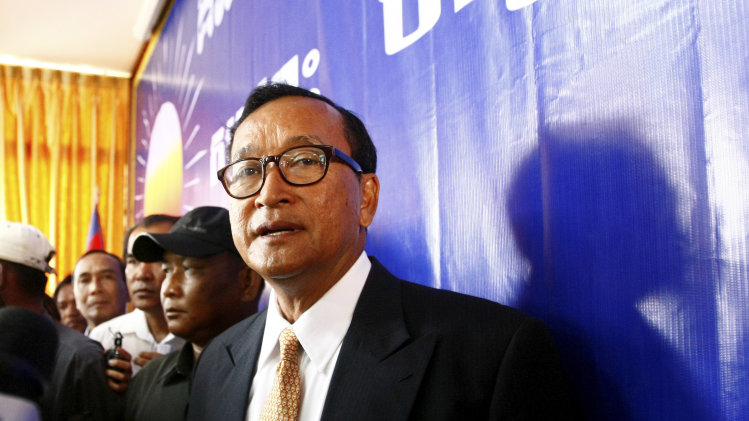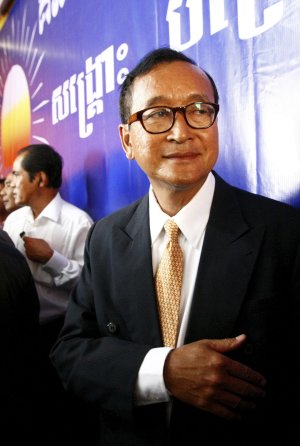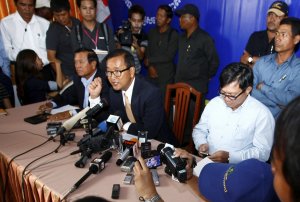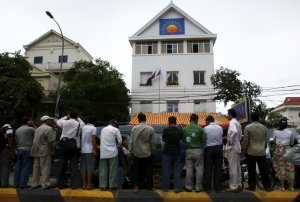
SOPHENG CHEANGPHNOM PENH, Cambodia (AP) — Cambodia's opposition leader on Monday
rejected the results of a contentious election won by the long-time
ruling party, even though the opposition made its biggest gains in
years.
The challenge by opposition leader Sam Rainsy, who returned
from exile last week to campaign for his Cambodia National Rescue
Party, could lead to post-poll instability and even parliamentary
paralysis.
Provisional results from Sunday's voting showed the
opposition capturing 55 of the 123 seats in the National Assembly. Prime
Minister Hun Sen's Cambodian People's Party won 68 seats, or a majority
of 55 percent.
Rainsy called for an independent investigation
into allegations that as many as a million people may have been deprived
of their right to vote, among other irregularities.
He said the
results protest was not a bargaining chip to get into government but
instead a sign that his party was "interested in rendering justice to
the Cambodian people to ensure that the will of the Cambodian people not
be distorted or reversed."
If
the opposition party boycotts the assembly — as has happened after past
elections — it may be impossible for Hun Sen to legally form a
government.
Rainsy did not specifically threaten a boycott, but
election experts pointed out that the constitution says a quorum of 120
assembly members is needed to open a parliamentary session, raising the
possibility that an opposition boycott could leave the country without a
fully functioning government.
Hun Sen has not spoken publicly
since the election. Mercurial in temperament, he has a record of
accepting neither defeat nor victory with good grace.
The
opposition's challenge could be mostly bluster. Hun Sen's ruling party
has control or dominating influence over all the state bureaucracy and
the courts and will almost certainly affirm the CPP victory. Past
appeals have not succeeded, and it was unclear what the opposition would
do if its complaints were not sustained.
Foreign countries such
as the United States, which had expressed doubts before the election
about its fairness, are unlikely to pursue the point with enthusiasm.
They have accepted the results of past elections with much more open
intimidation and violence as fair enough, and will likely regard this
year's results as a major step forward.
The
opposition could nonetheless cause a lot of mischief by refusing to
take its seats. Hun Sen could seek to open parliament through a legal
loophole, though such a move would support charges of unfairness and
autocratic behavior.
He could also simply try to wait out his
opponent as head of a caretaker government. The position would be
awkward, but also preserve the status quo, which leaves his hands on the
levers of power.
Cambodia faced a similar situation after its
2003 election, when Hun Sen's party failed to win enough seats to
legally form a government on its own. The deadlock was broken only after
11 months and violence in the streets. But Hun Sen faced a divided
opposition then, while his opponents this time are united.
Critics
alleged that the election process was heavily rigged toward the ruling
party. Rainsy's party and nonpartisan groups charged that the ruling
party used the machinery of government and security forces in an unfair
manner to reward or pressure voters. They also said that voter
registration procedures were badly flawed, possibly leaving more than 1
million people disenfranchised.
The combined opposition had held
just 29 seats in the last assembly. It was a precarious foothold — they
were kicked out on highly technical grounds by their ruling party
colleagues just before campaigning began.
A
day ahead of the election, Rainsy said the polls would mark a new
chapter in Cambodia's history, and the "beginning of people power."
"The
run-up to elections has shown the emergence of a young generation,
which rather than prizing stability as their elders, conceived of the
elections in terms of 'change or no change,'" noted Astrid
Norén-Nilsson, a Cambodia scholar from the University of Cambridge.
"The
election results make it clear that these constitute a non-negligible
new force in the Cambodian political landscape, and that the CPP will
need to take a more conciliatory approach to the opposition, both in
policy-making and in political discourse. Otherwise, there is a real
possibility that a politically polarized population will raise the risk
for social tension and social unrest."




No comments:
Post a Comment